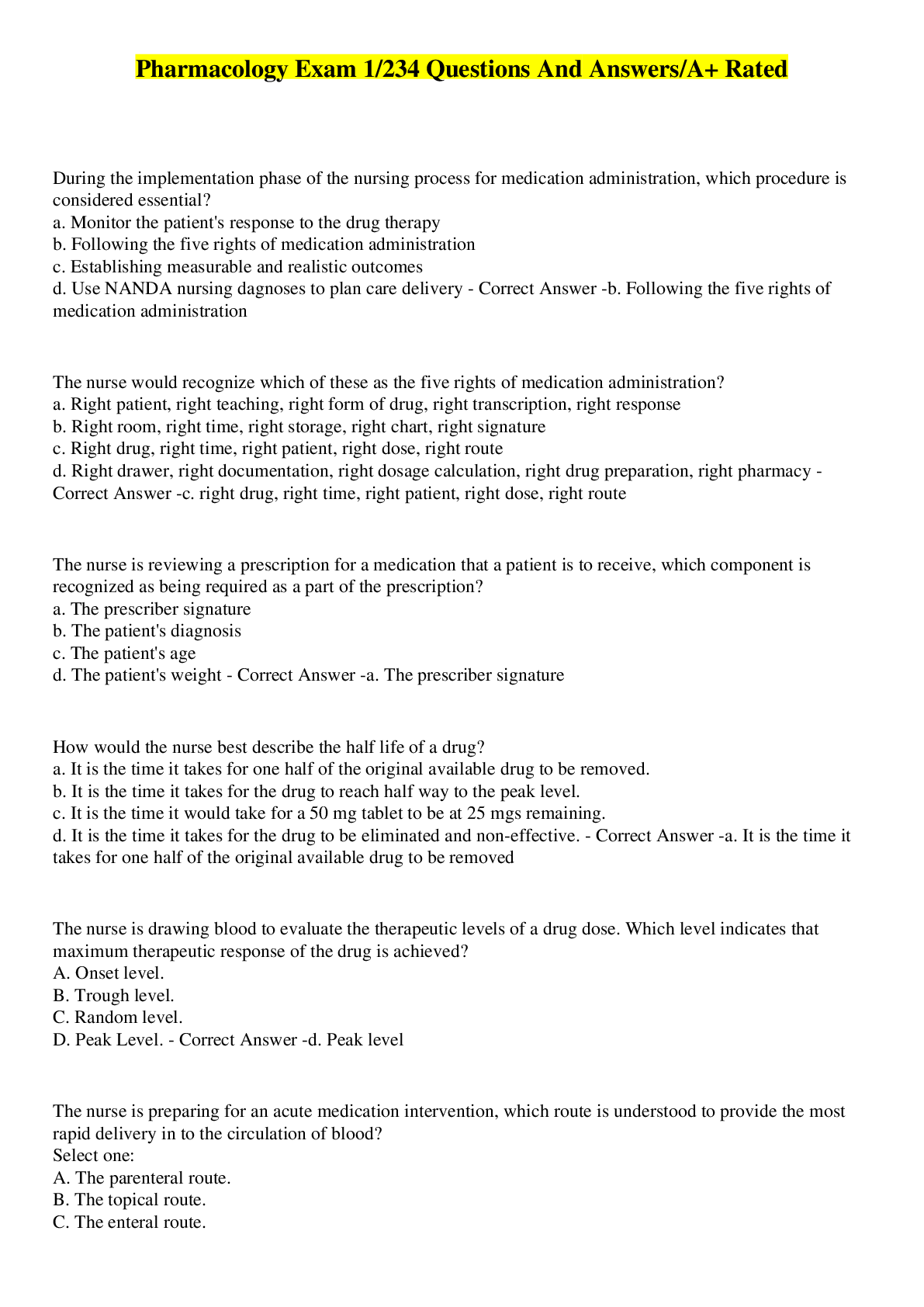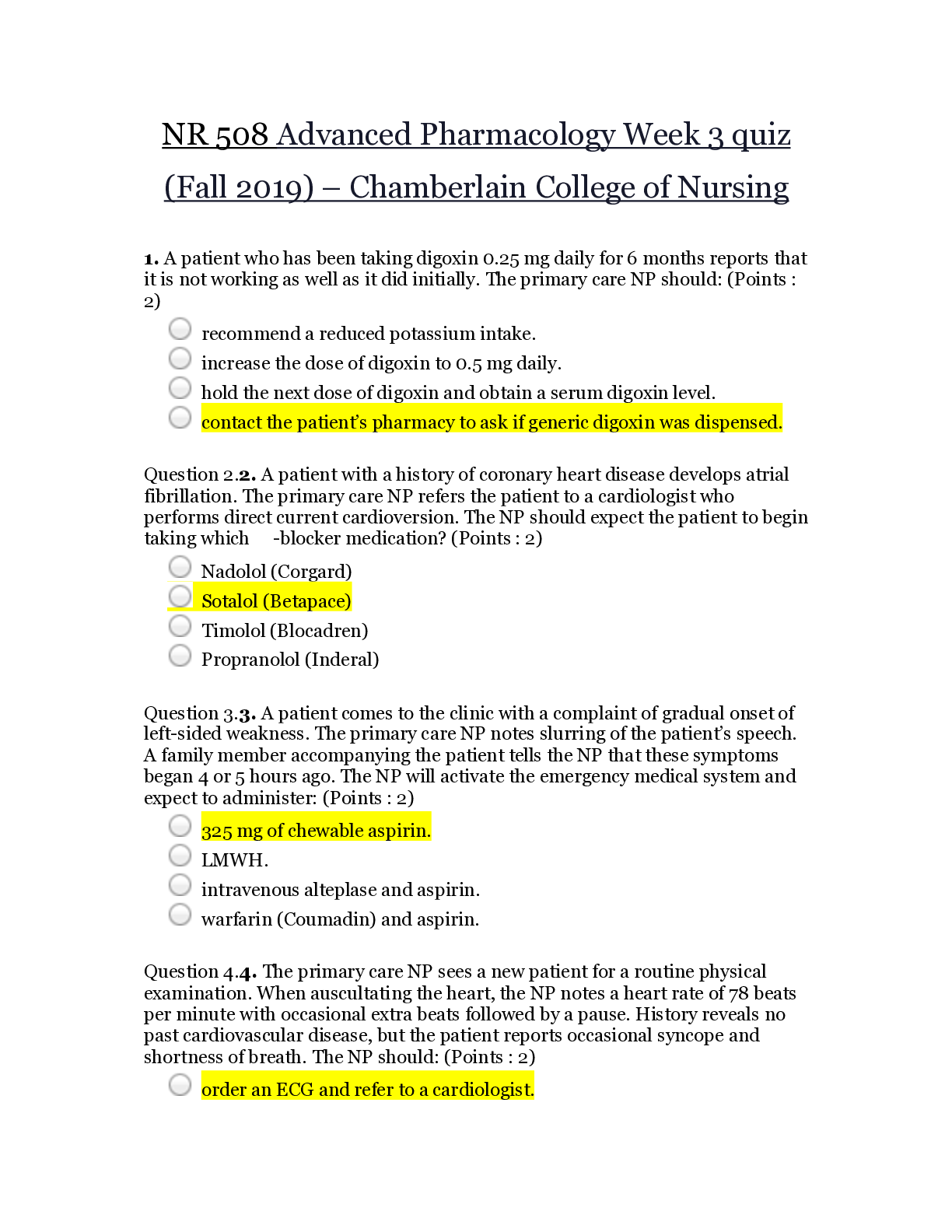Pharmacology > EXAM > NR 508 Advanced Pharmacology Week 5 quiz – Chamberlain College of Nursing / NR508 Advanced Pharmac (All)
NR 508 Advanced Pharmacology Week 5 quiz – Chamberlain College of Nursing / NR508 Advanced Pharmacology Week 5 quiz
Document Content and Description Below
NR 508 Advanced Pharmacology Week 5 quiz ( Fall 2019) – Chamberlain College of Nursing 1. A primary care NP sees a patient who reports a 2-week history of nasal congestion and runny nose. The NP... performs a history and learns that the nasal discharge has changed from yellow to green in the past few days, accompanied by a fever of 102° F and unilateral facial pain. To treat this patient, the NP should: (Points : 2) order azithromycin daily for 5 days. prescribe cefdinir twice daily for 10 days. prescribe amoxicillin-clavulanate twice daily for 10 days. recommend symptomatic treatment because this is probably a viral infection. Question 2.2. A patient has confirmed Rocky Mountain spotted fever, and the infectious disease specialist is treating the patient with doxycycline 100 mg orally for 7 days. The patient comes to the clinic for follow-up care with the primary care NP at the end of therapy and reports continued fever, headache, and myalgia. The NP will consult with the infectious disease specialist and order: (Points : 2) 7 more days of doxycycline. erythromycin 250 mg four times daily for 7 days. amoxicillin 500 mg three times daily for 10 to 14 days. hospital admission for intravenous chloramphenicol. Question 3.3. An adult patient has cellulitis. The patient is a single parent with health insurance who works and is attending classes at a local university. To treat this infection, the primary care nurse practitioner (NP) should prescribe: (Points : 2) cefdinir (Omnicef). cephalexin (Keflex). cefadroxil (Duricef). ceftriaxone (Rocephin). Question 4.4. A 70-year-old patient will begin taking cefdinir (Omnicef) for an acute exacerbation of COPD. Before initiating therapy, the primary care NP should order: (Points : 2) liver function tests (LFTs). coagulation studies. an electrocardiogram (ECG). a creatinine clearance test. Question 5.5. When prescribing TMP/SMX to children, the primary care NP should recall that: (Points : 2) dosing is based on the trimethoprim component of the drug. TMP/SMX should not be prescribed for children younger than 2 years. folic acid supplements must be given to children who take this medication. the medication should be given three or four times per day because of rapid metabolism. Question 6.6. A 5-year-old child who has no previous history of otitis media is seen in clinic with a temperature of 100° F. The primary care NP visualizes bilateral erythematous, nonbulging, intact tympanic membranes. The child is taking fluids well and is playing with toys in the examination room. The NP should: (Points : 2) prescribe azithromycin once daily for 5 days. prescribe amoxicillin twice daily for 10 days. prescribe amoxicillin-clavulanate twice daily for 10 days. initiate antibiotic therapy if the child’s condition worsens. Question 7.7. The primary care NP is preparing to prescribe sildenafil for a man who has erectile dysfunction. The NP should remember to tell this patient: (Points : 2) to avoid oral nitrates while taking this medication. that the drug may cause penile aching. to use a condom if his sexual partner is pregnant. dyspepsia may occur and may warrant discontinuation of the drug. Question 8.8. A woman has a Chlamydia infection. Before initiating treatment with a tetracycline antibiotic, the primary care nurse practitioner (NP) should: (Points : 2) perform a pregnancy test. obtain baseline liver function and renal function tests. check her bilirubin and serum amylase levels. tell her she must stop using oral contraceptive pills. Question 9.9. A patient is taking levofloxacin to treat sinusitis. The patient calls the primary care NP to report pain just above the heel of the right foot. The NP should: (Points : 2) change to ofloxacin. change to ciprofloxacin. discontinue the levofloxacin. reassure the patient that this is a common side effect. Question 10.10. A patient comes to the clinic with a history of fever of 102° F for several days, poor appetite, and cough. A sputum culture is pending, but Gram stain indicates a bacterial infection. The primary care nurse practitioner (NP) should: (Points : 2) begin empirical antibiotic therapy. use a broad-spectrum antibiotic for initial treatment. prescribe an antibiotic when culture and sensitivity results are known. offer symptomatic treatment only unless the patient’s condition worsens. Question 11.11. A primary care nurse practitioner (NP) is prescribing once-daily azithromycin to a 25-year-old woman. When teaching her about the drug, the NP should tell her to: (Points : 2) take the medication on an empty stomach. use a backup contraception method other than oral contraceptive pills. expect severe gastrointestinal side effects while taking this drug. cut the pill in half and take twice daily if side effects are severe. Patients who use oral contraceptive pills for birth control should be advised that macrolidescan reduce their efficacy and that they should consider using a backup method ofcontraception. Azithromycin can be taken without regard to food. Severe gastrointestinal sideeffects are uncommon. The tablets should not be chewed, crushed, or cut. Question 12.12. A patient comes to the clinic before a trip to an area where malaria is endemic. The primary care NP will prescribe: (Points : 2) tinidazole (Tindamax). metronidazole (Flagyl). chloroquine (Plaquenil). amantadine (Symmetrel). Chloroquine is used as malaria prophylaxis. Question 13.13. A patient who has genital herpes has frequent outbreaks. The patient asks the primary care NP why it is necessary to take oral acyclovir all the time and not just for acute outbreaks. The NP should explain that oral acyclovir may: (Points : 2) prevent the virus from developing resistance. cause episodes to be shorter and less frequent. actually eradicate the virus and cure the disease. reduce the chance of transmitting the virus to others. Oral acyclovir has prevented or reduced the frequency of severity of recurrences in more than95% of patients and so should be given to patients with recurrent episodes. It does not affectresistance. The antiviral medication does not eradicate the virus; it prevents replication. Thedisease is transmitted even without symptoms. Question 14.14. A primary care NP sees a 6-month-old patient who has a persistent staccato cough. The NP is aware that there is a pertussis outbreak in the community. The NP should obtain appropriate cultures and treat empirically with: (Points : 2) erythromycin. azithromycin. clarithromycin. telithromycin. Erythromycin is a first-choice drug for the treatment of pertussis. Question 15.15. A patient who has been taking ciprofloxacin for 14 days for treatment of a UTI is seen in the clinic for a follow-up urinalysis. The urinalysis reveals crystalluria. The primary care NP should: (Points : 2) discontinue the ciprofloxacin. decrease the dose of ciprofloxacin. change the antibiotic to norfloxacin. counsel the patient to increase fluid intake. Fluoroquinolones can cause renal irritation and urine crystals. Patients should be advisedto maintain proper hydration to avoid this. It is not necessary to discontinue theciprofloxacin or to decrease the dose. Question 16.16. A patient is seen in the clinic with a 1-week history of frequent watery stools. The primary care NP learns that a family member had gastroenteritis a week prior. The patient was treated for a UTI with a sulfonamide antibiotic 2 months prior. The NP should suspect: (Points : 2) Clostridium difficile–associated disease (CDAD). viral gastroenteritis. serum sickness reaction. recurrence of the UTI. Cases of CDAD have been reported 2 months after a course of antibiotics, and CDAD should be suspected in all patients who present with diarrhea after antibiotic use. Viral gastroenteritis is possible, but the possibility of CDAD must be investigated. Serum sickness reaction is not usually associated with diarrhea and generally occurs within weeks of drug administration. Question 17.17. A patient reports having urinary frequency and discomfort associated with urination. After a careful physical examination and history to determine the cause, the NP should prescribe a medication from which drug class? (Points : 2) Cholinergics Antispasmodics? Anticholinergics Urinary tract analgesics Question 18.18. A primary care NP provides teaching to a patient who will begin taking cefadroxil (Duricef). Which statement by the patient indicates a need for further teaching? (Points : 2) “I should report any rash that occurs.” “I will take this medication twice daily.” “I should take this medication with food.” “Gastrointestinal (GI) symptoms are common but not worrisome.” The FDA advises that CDAD be considered in all patients who present with diarrhea afterantibiotic use. Patients should be taught to report all GI symptoms. Question 19.19. While a patient is receiving an aminoglycoside medication by intramuscular injection, the provider should instruct the patient to expect: (Points : 2) discomfort to the injection site, which can be treated with warm moist heat. development of localized infection, which can be treated with an occlusive dressing. discomfort to the injection site, which can best be relieved with narcotic analgesics. development of localized bleeding, which may require the application of an occlusive dressing. The administration of aminoglycosides by intramuscular injection may cause discomfort tothe injection site, which can be treated with warm moist heat and mild analgesics. Question 20.20. A young woman will begin taking minocycline. The primary care NP should tell this patient to: (Points : 2) avoid taking antacids while taking this drug. expect headaches while taking this medication. always take the medication on an empty stomach. use a backup form of contraception if currently taking oral contraceptive pills. Tetracyclines may decrease the effects of oral contraceptive pills, sopatients should use a backup form of contraception. Headaches areuncommon. Minocycline may be taken with food and is not affected byantacids Question 21.21. A patient who was hospitalized for an infection was treated with an aminoglycoside antibiotic. The patient asks the primary care nurse practitioner (NP) why outpatient treatment wasn’t an option. The NP should tell the patient that aminoglycoside antibiotics: (Points : 2) are more likely to be toxic. cause serious adverse effects. carry more risk for serious allergic reactions. must be given intramuscularly or intravenously. Aminoglycoside antibiotics must be given intramuscularly or intravenously when treatinginfection. Their side effects may be serious, which is an indication for hospitalization. Question 22.22. A 60-year-old patient comes to the clinic reporting a sudden onset of a painful rash that began the day before. The primary care NP notes a vesicular rash along a dermatome on one side of the patient’s back. The patient has a low-grade fever. The NP will prescribe: (Points : 2) varicella vaccine. acyclovir (Zovirax). metronidazole (Flagyl). amantadine (Symmetrel). Question 23.23. A patient has urethritis. The primary care NP should prescribe: (Points : 2) minocycline. doxycycline. tetracycline. demeclocycline. Minocycline is indicated to treat urethritis. Question 24.24. A primary care NP provides primary care for a woman who has HIV. The woman asks the NP if she will ever be able to have children. The NP should tell her: (Points : 2) none of the antiretroviral medications are safe to take during pregnancy. she will need to take medications throughout her pregnancy and lactation. there is no risk of disease transmission to a fetus if she complies with therapy. strict adherence to antiretroviral therapy decreases her risk of transmitting HIV to the fetus. Antiretroviral therapy reduces, but does not eliminate, the risk oftransmitting HIV to the fetus. Antiretroviral therapy medications may betaken during pregnancy. Women with HIV should not breastfeed becauseof the high risk of transmission Question 25.25. A new patient comes to see the primary care NP with fever, mild dehydration, and dysuria with flank pain. The patient tells the NP that a previous provider always prescribed trimethoprim-sulfamethoxazole and wonders why a urine culture is necessary because this antibiotic has worked in the past. The NP should tell this patient that a culture is necessary to help determine: (Points : 2) the correct dose of the antibiotic. whether antibiotic resistance is occurring. whether multiple organisms are causing infection. the length of antibiotic therapy needed to treat the infection. Antibiotic resistance can occur when bacteria are repeatedly exposed to antibiotic agents.Even though a particular antibiotic is effective for a certain type of infection, resistance canoccur, and another antibiotic may be necessary. A culture and sensitivity test is essential forchoosing the right antibiotic. The culture and sensitivity test does not help determine the doseor the length of therapy. [Show More]
Last updated: 1 year ago
Preview 1 out of 11 pages
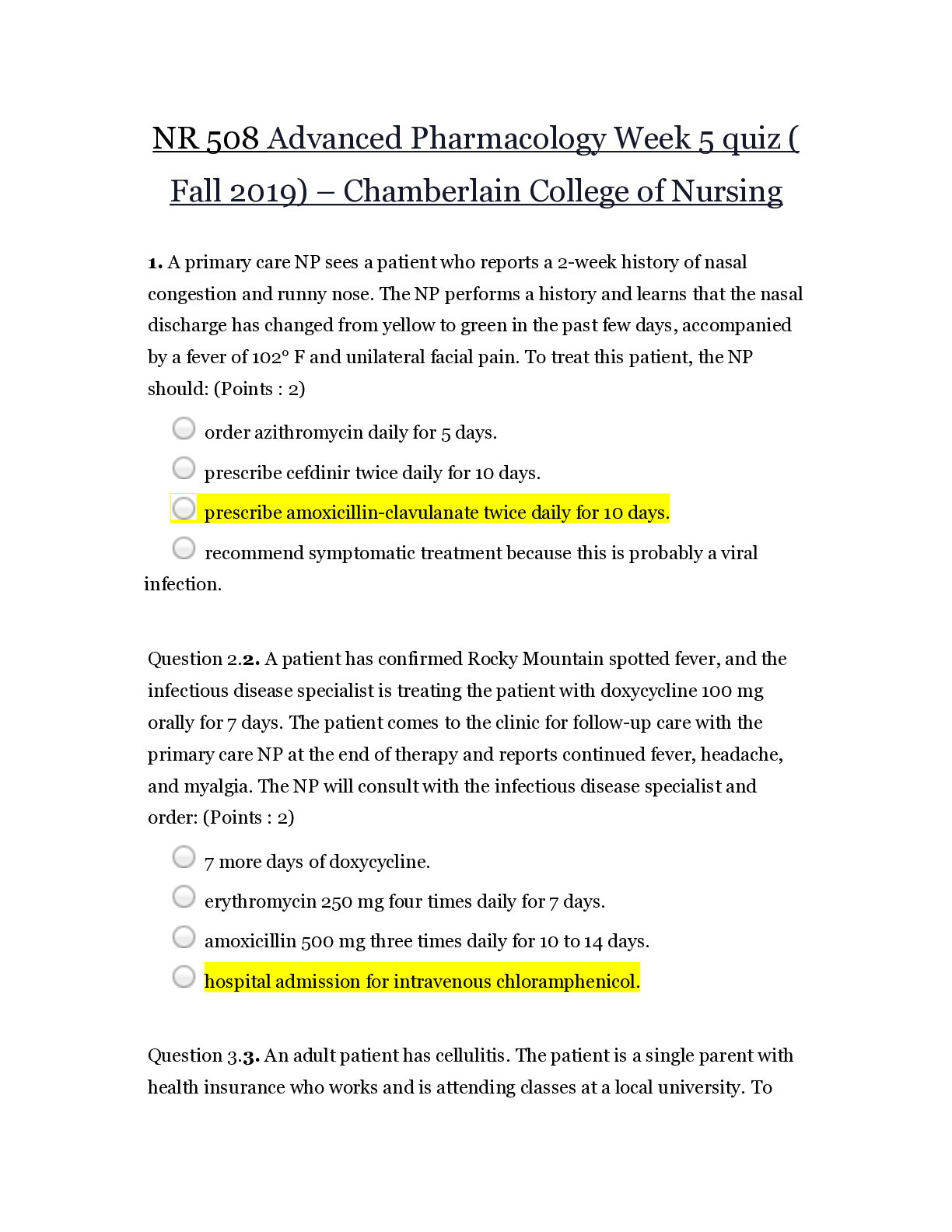
Reviews( 0 )
Document information
Connected school, study & course
About the document
Uploaded On
Jun 02, 2020
Number of pages
11
Written in
Additional information
This document has been written for:
Uploaded
Jun 02, 2020
Downloads
0
Views
44

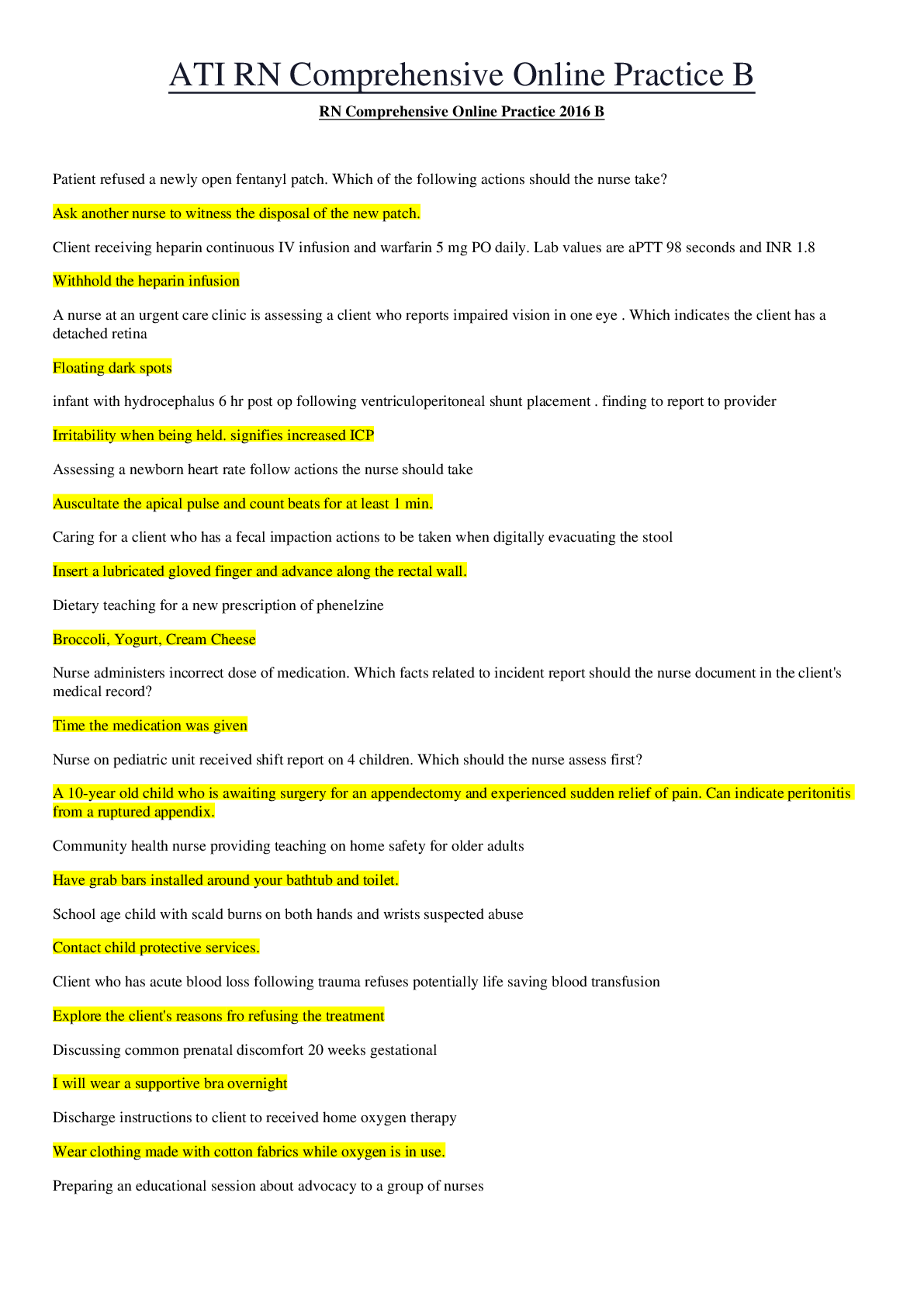
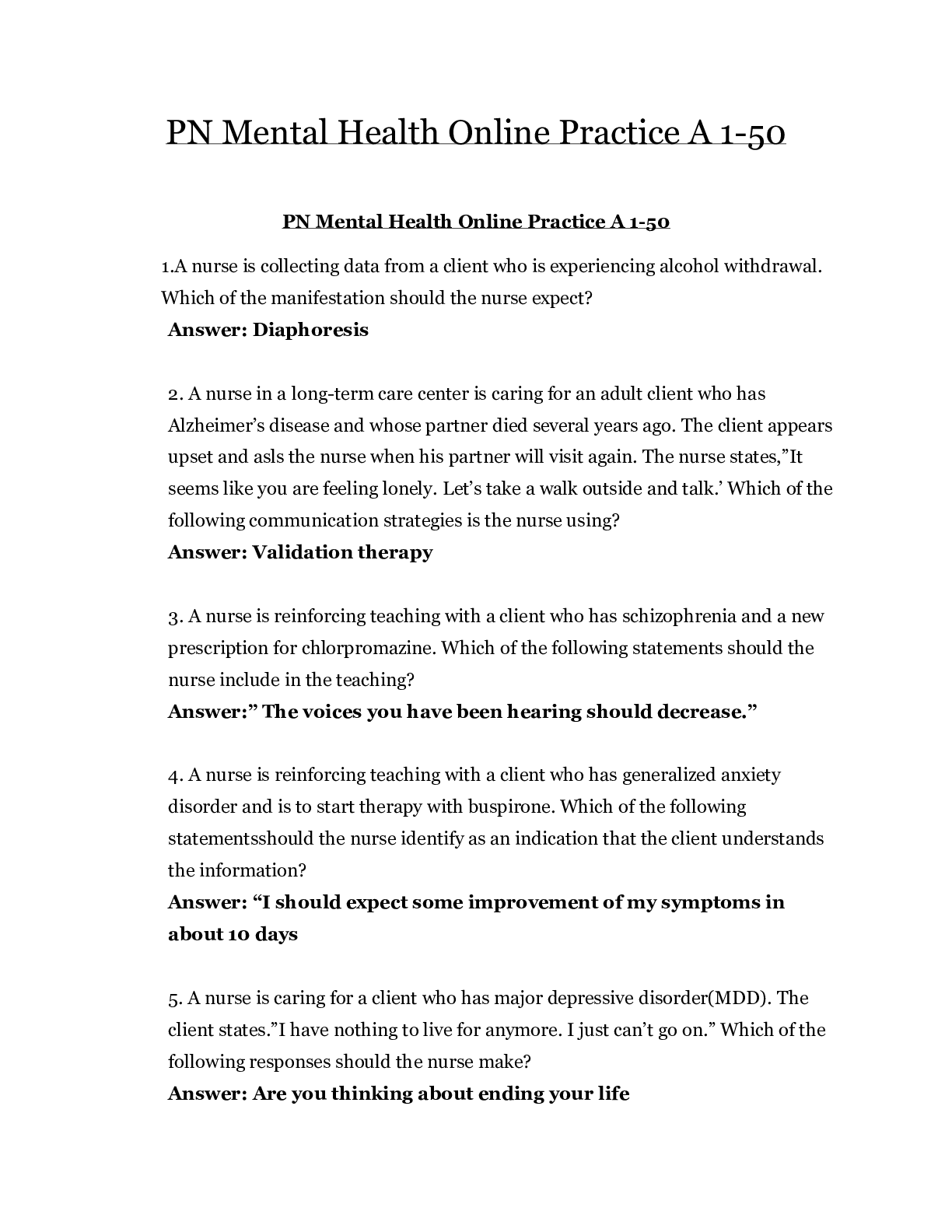
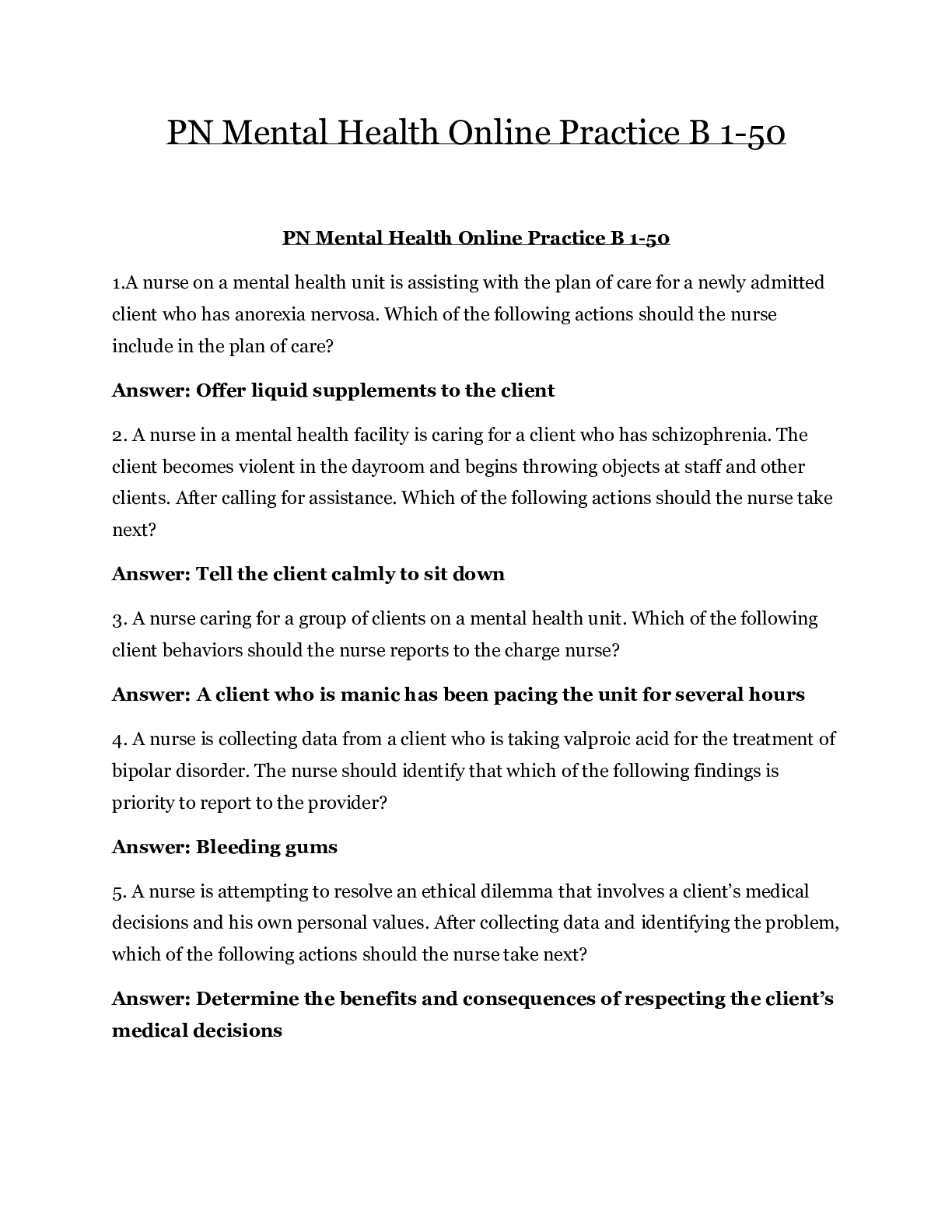
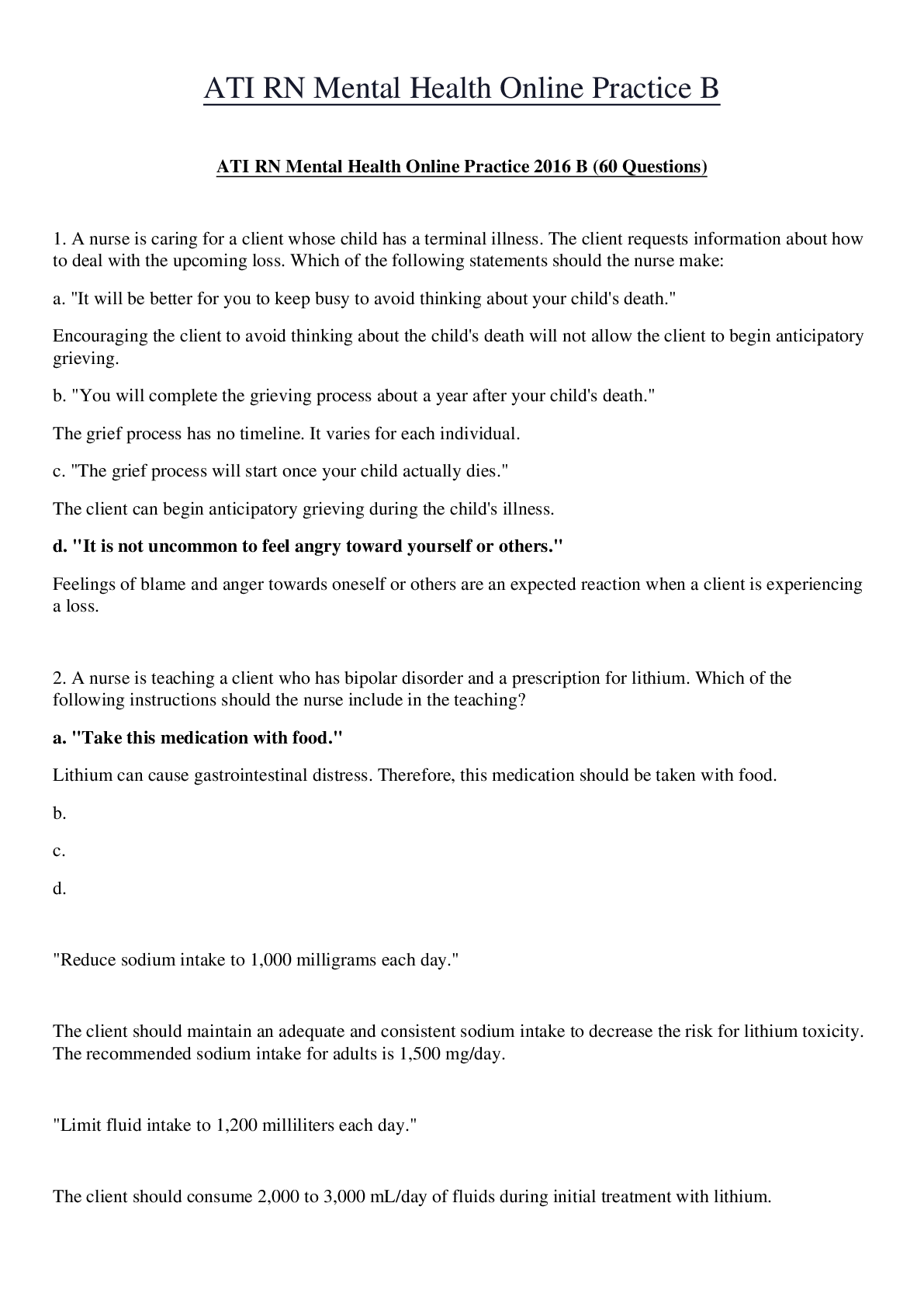
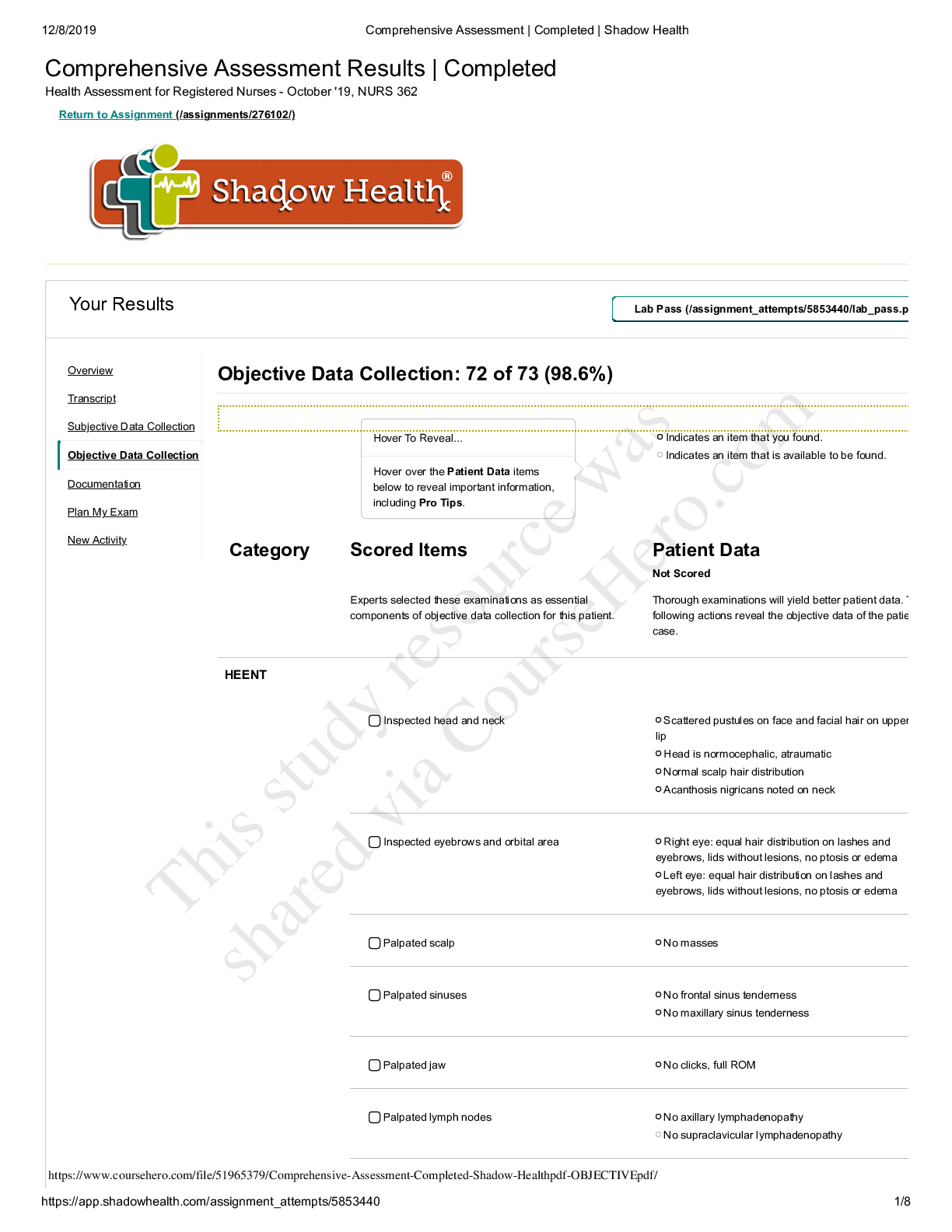

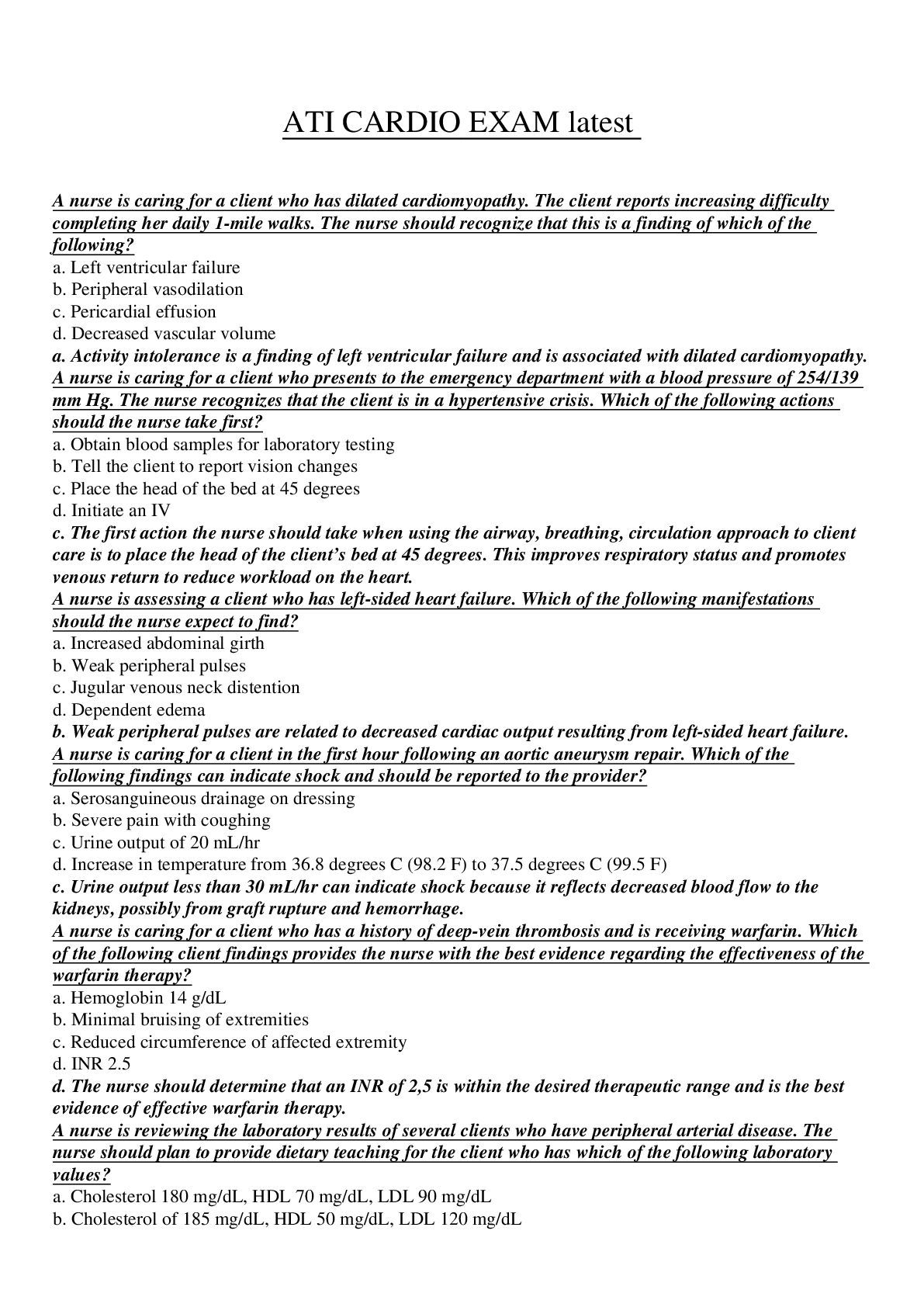
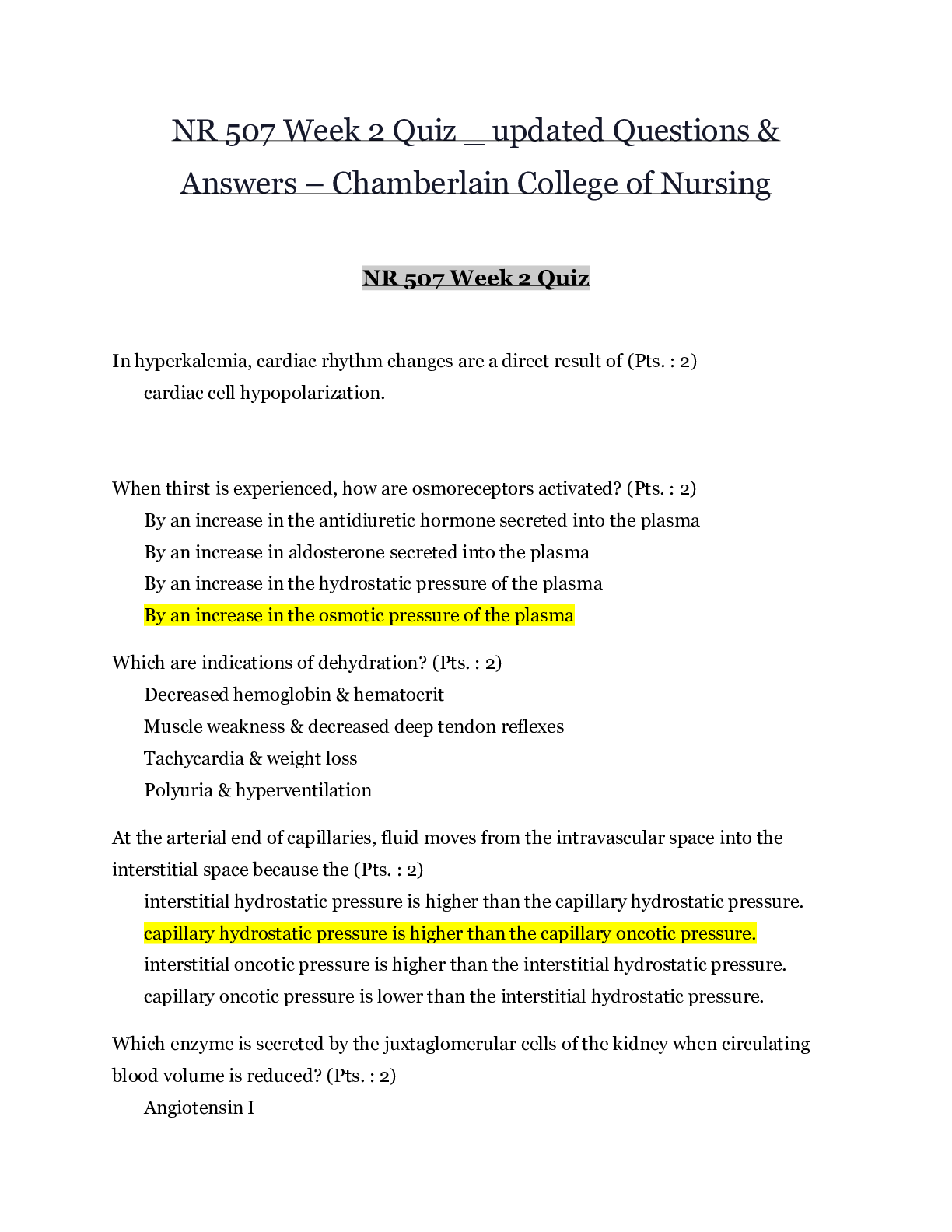
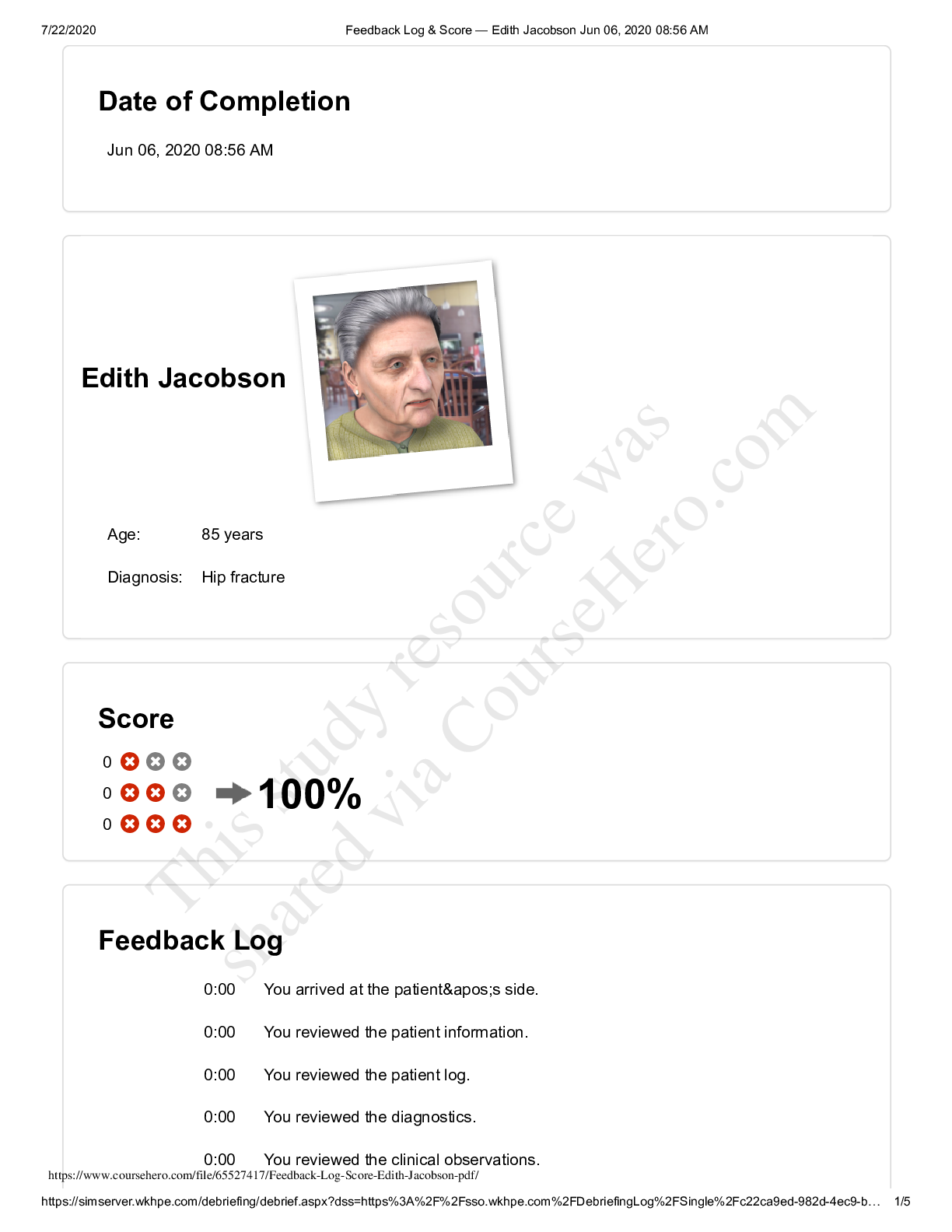
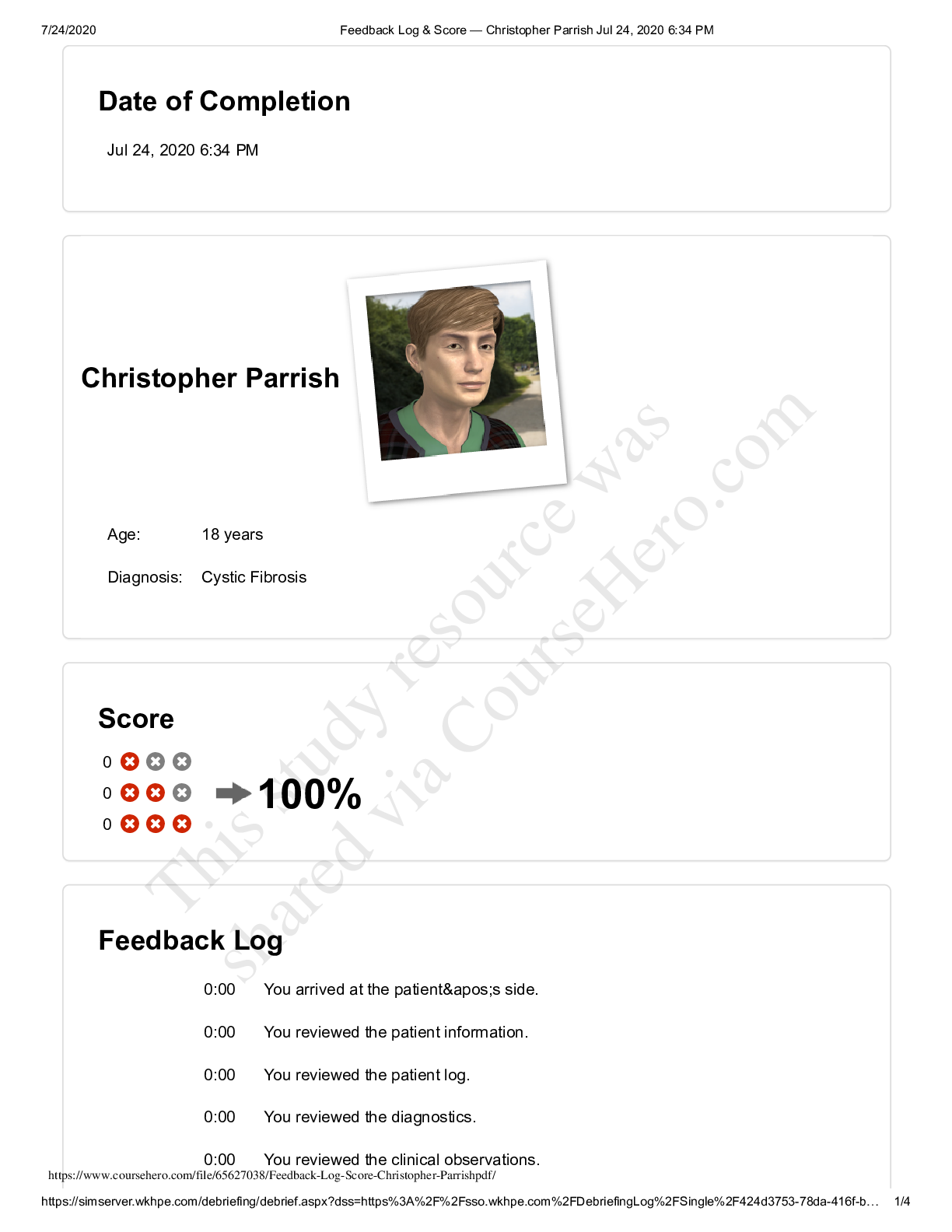
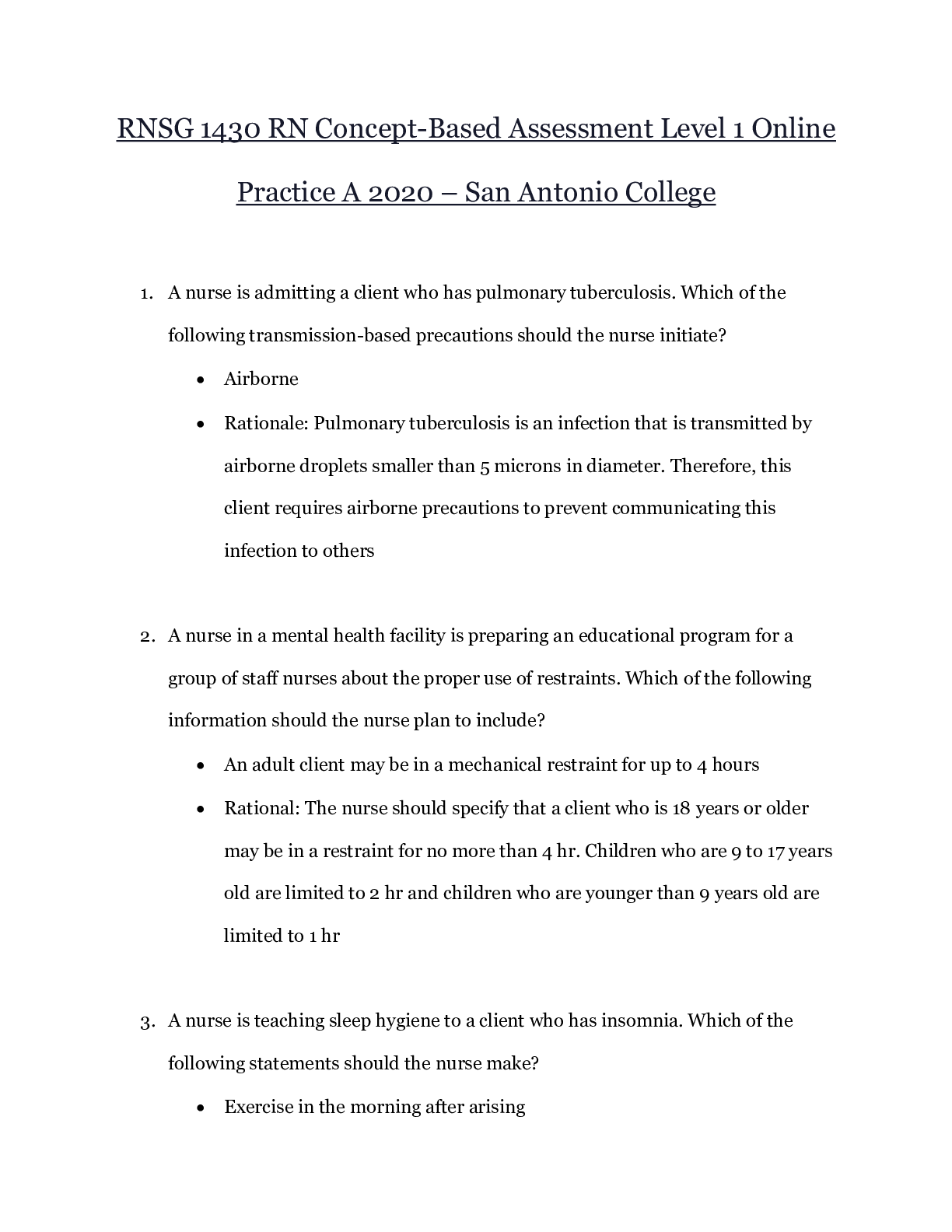
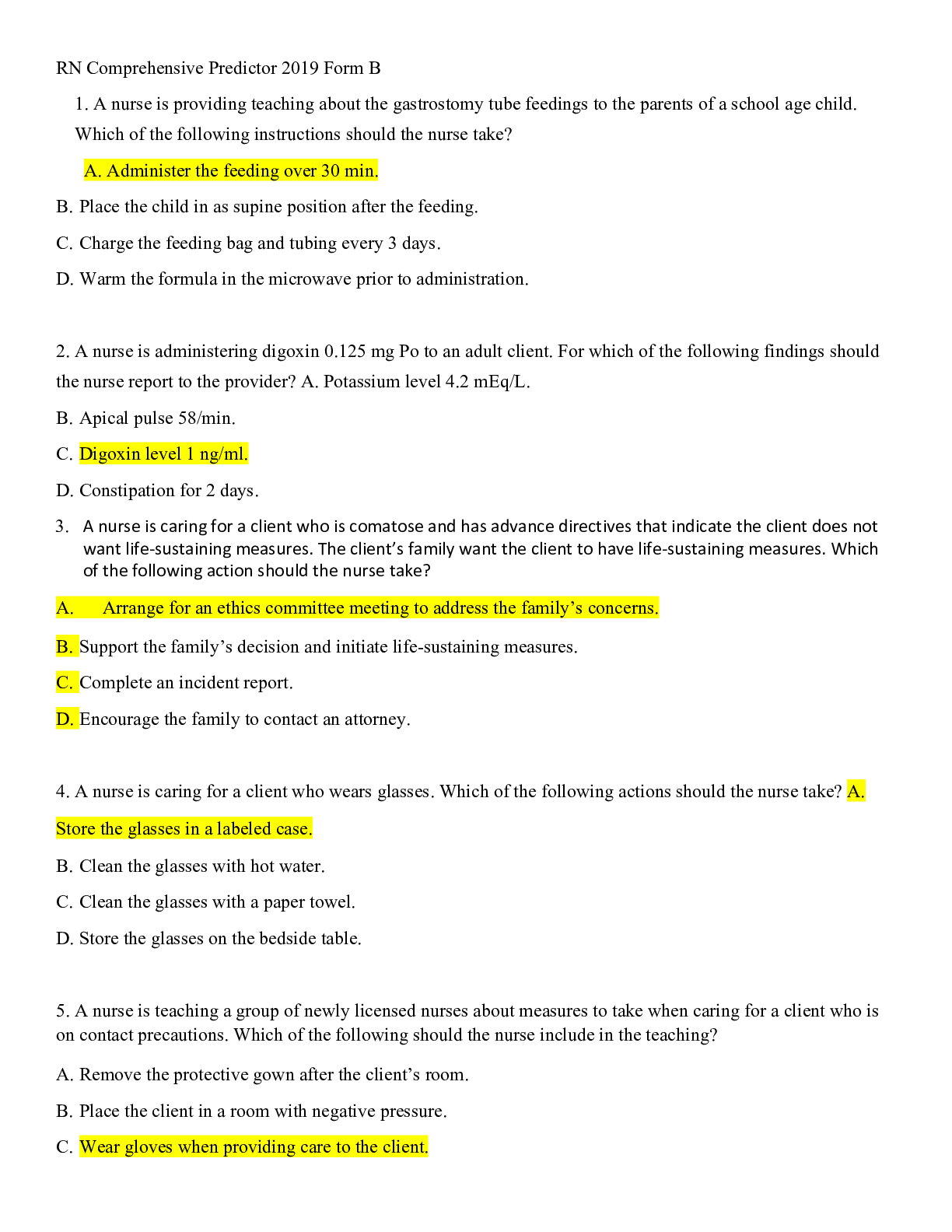

 – CHAMBERLAIN COLLEGE OF NURSING.png)
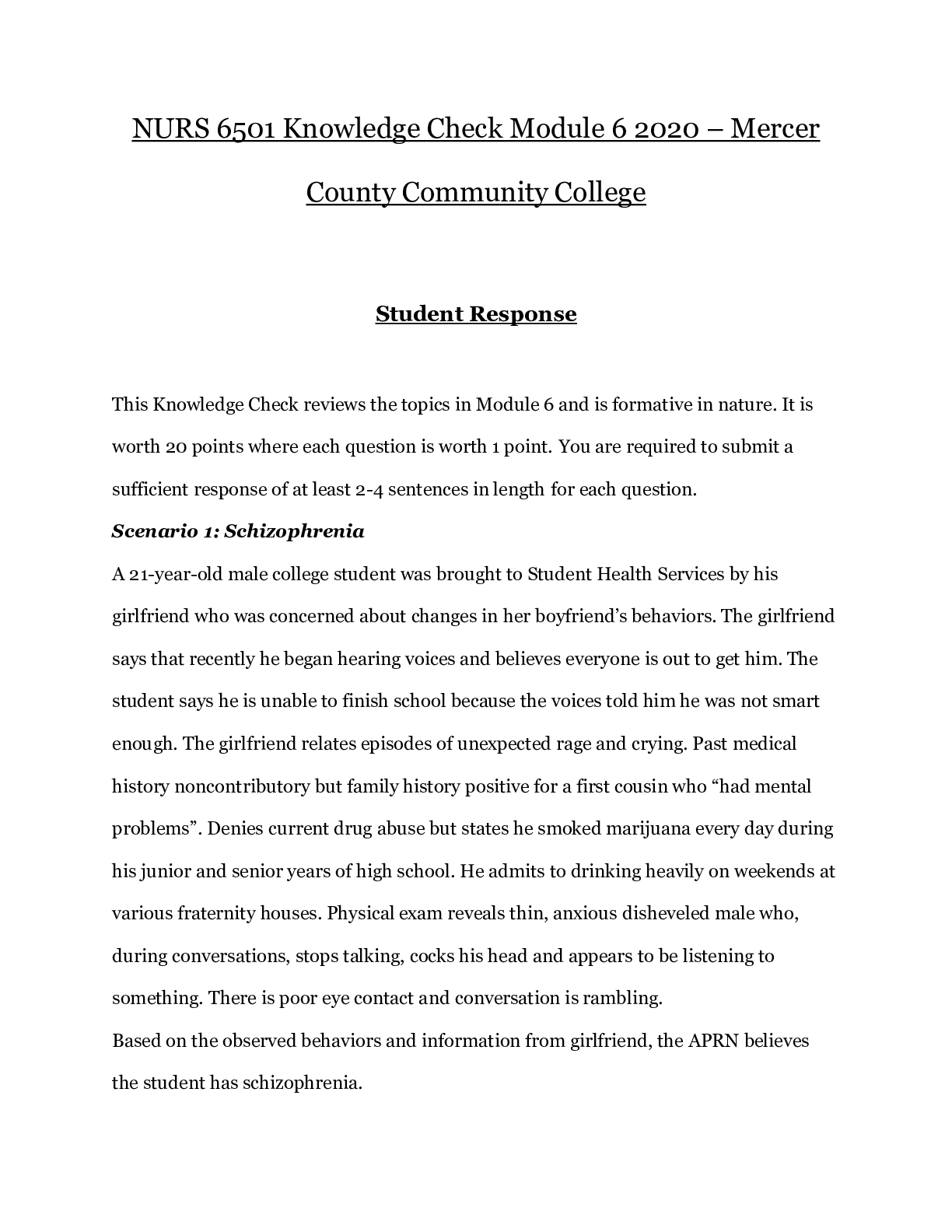
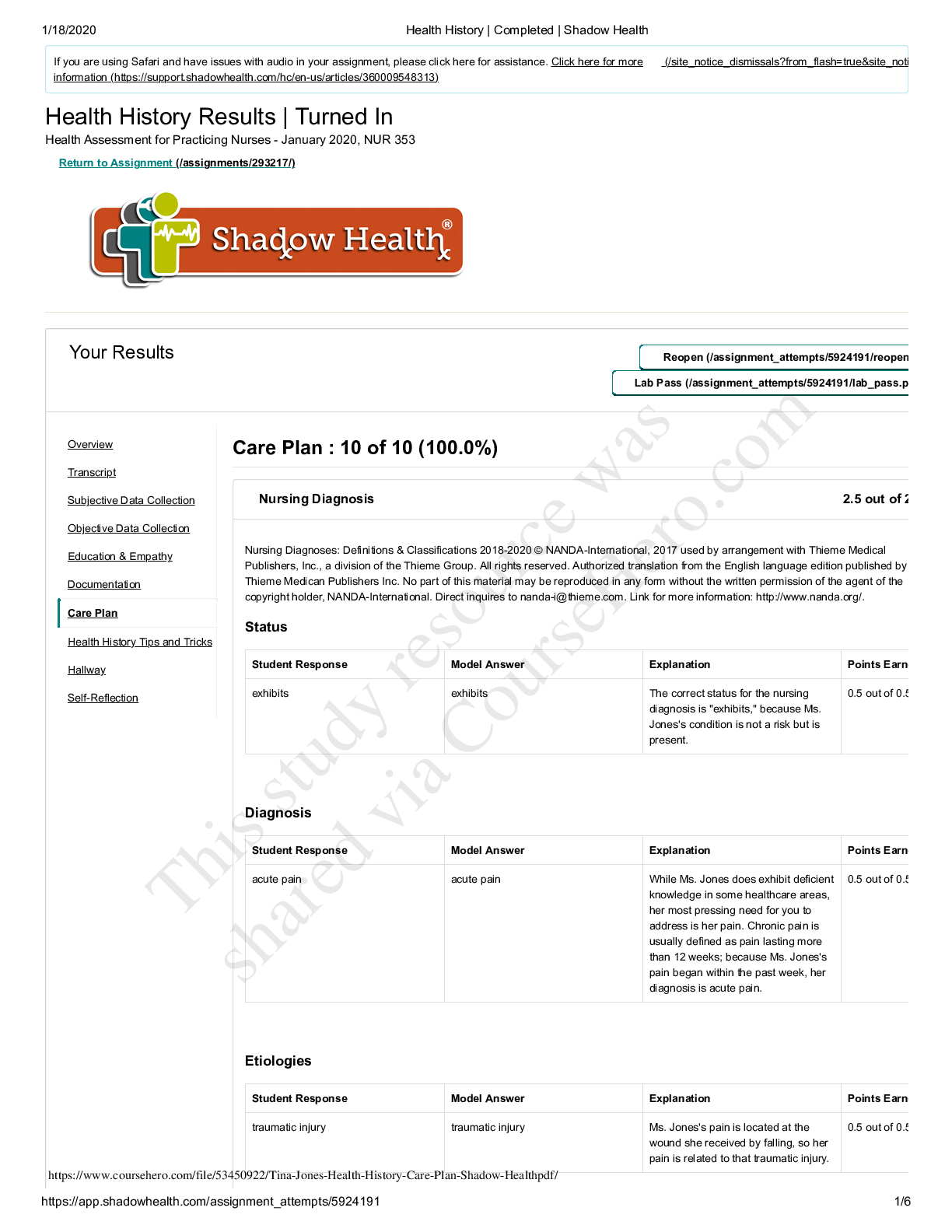


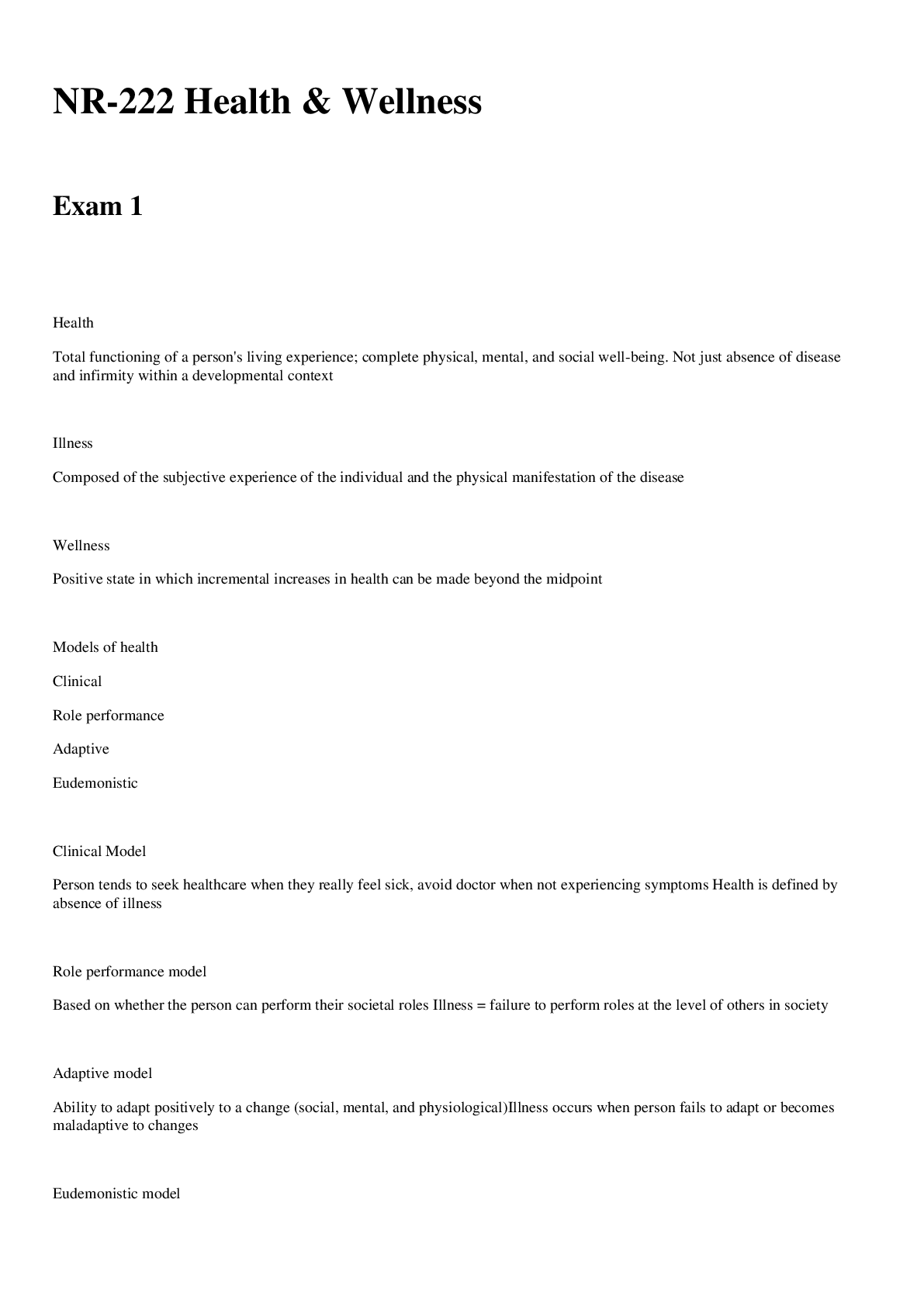
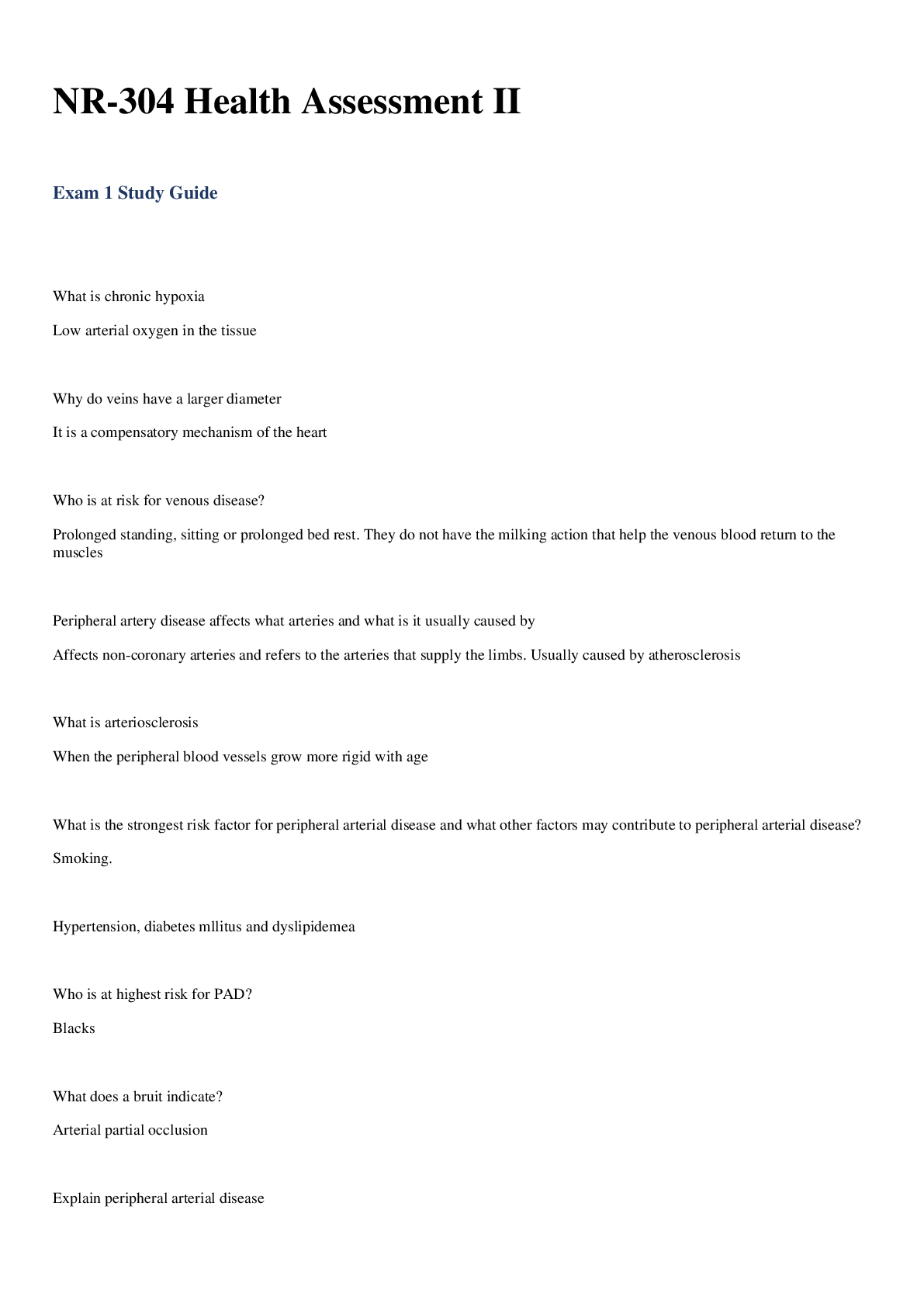
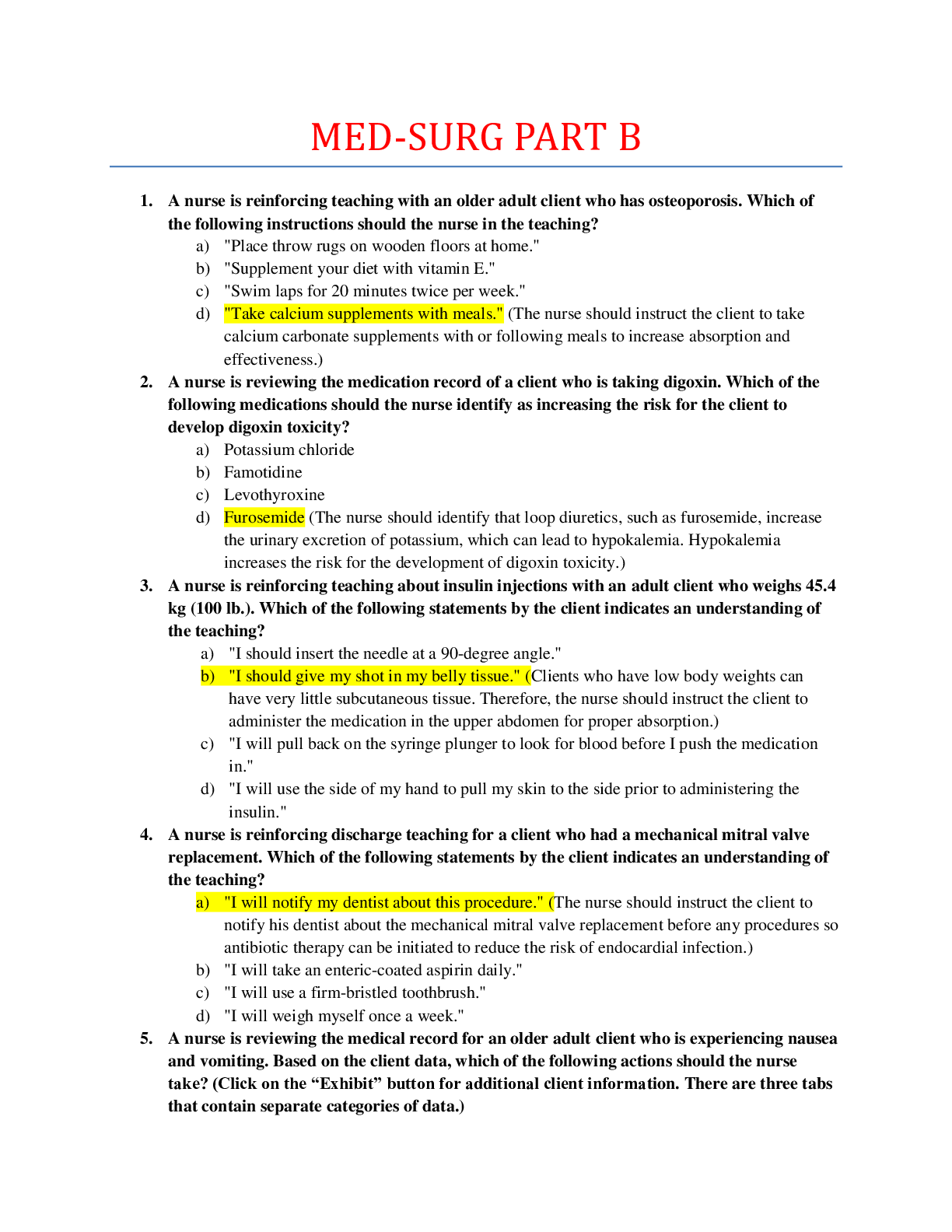
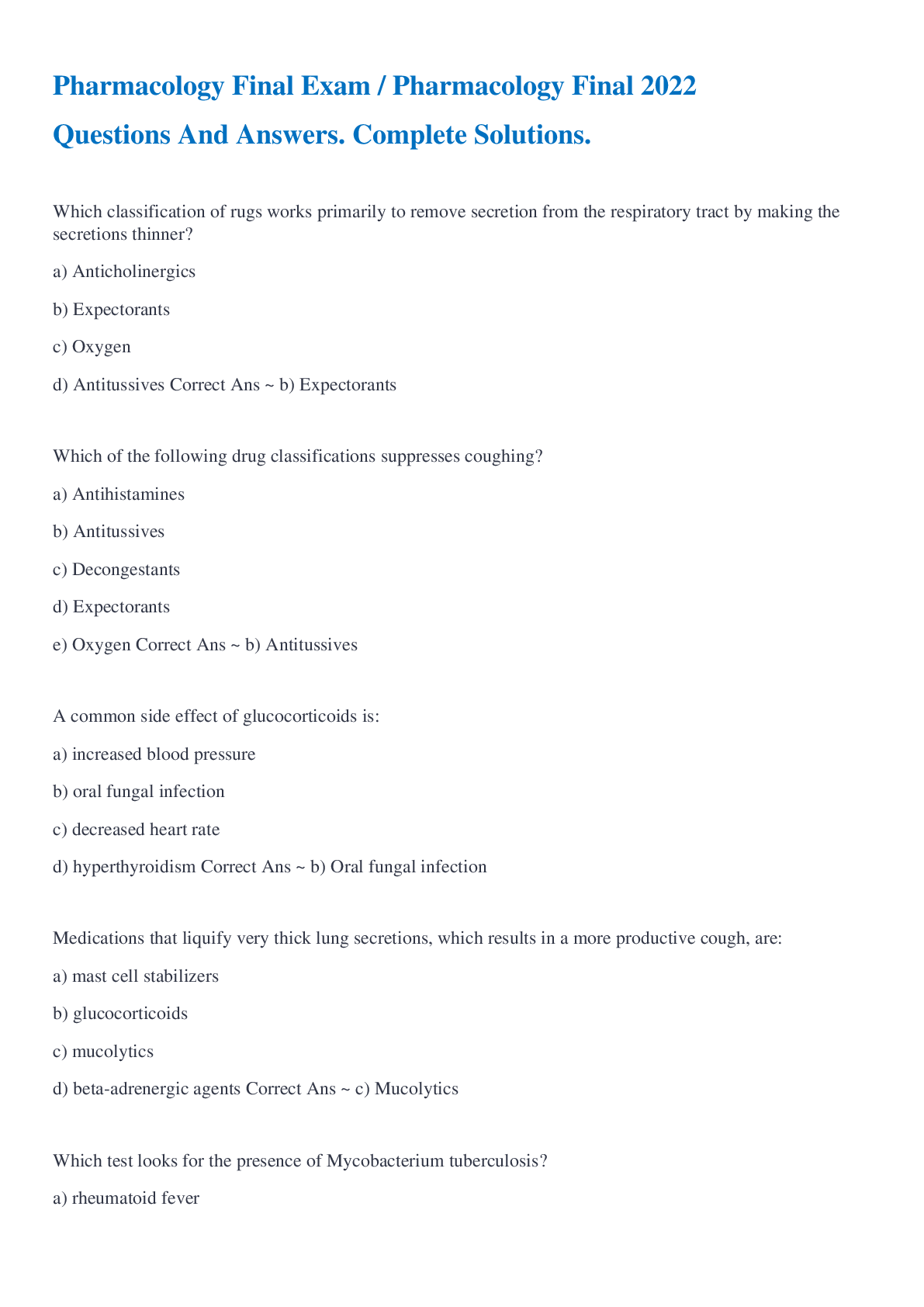
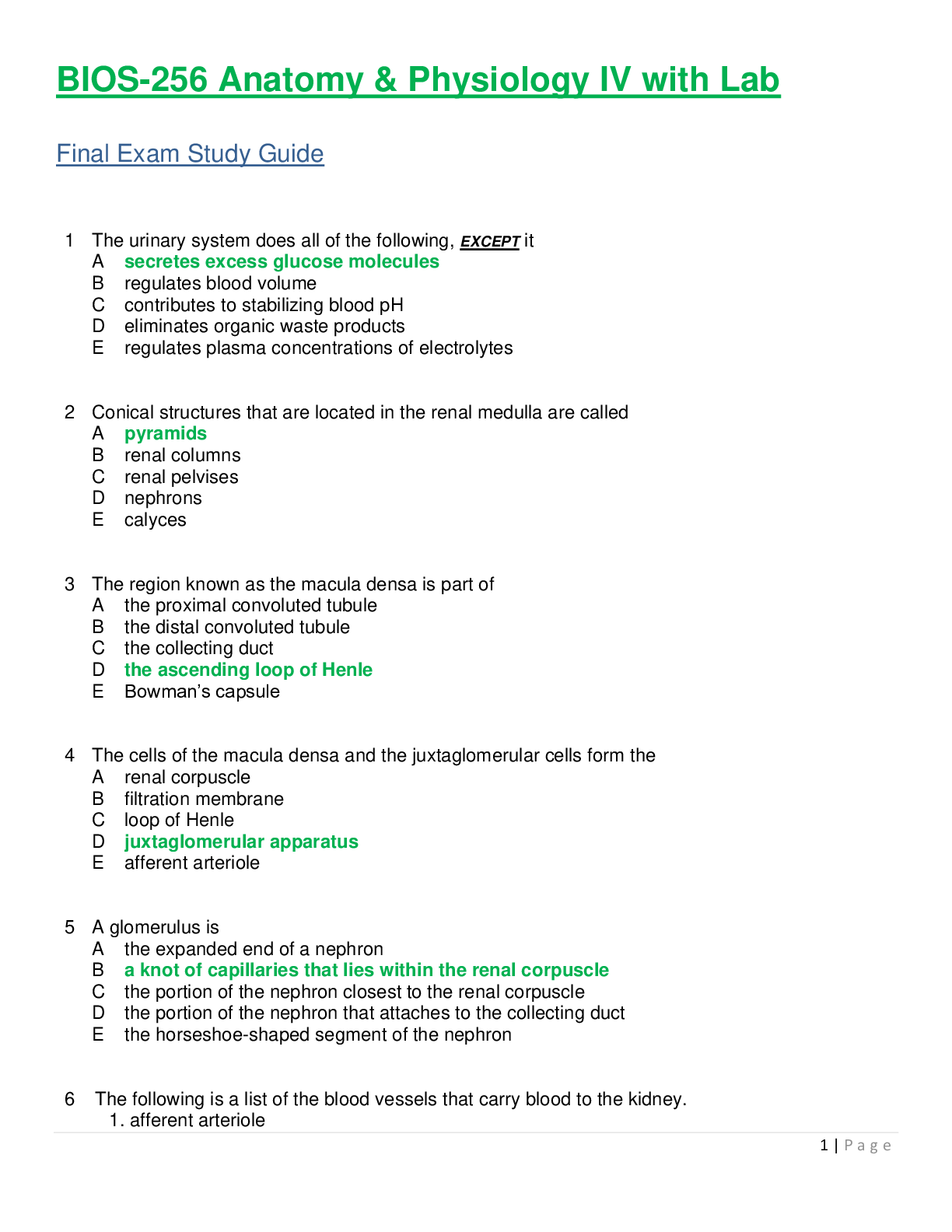
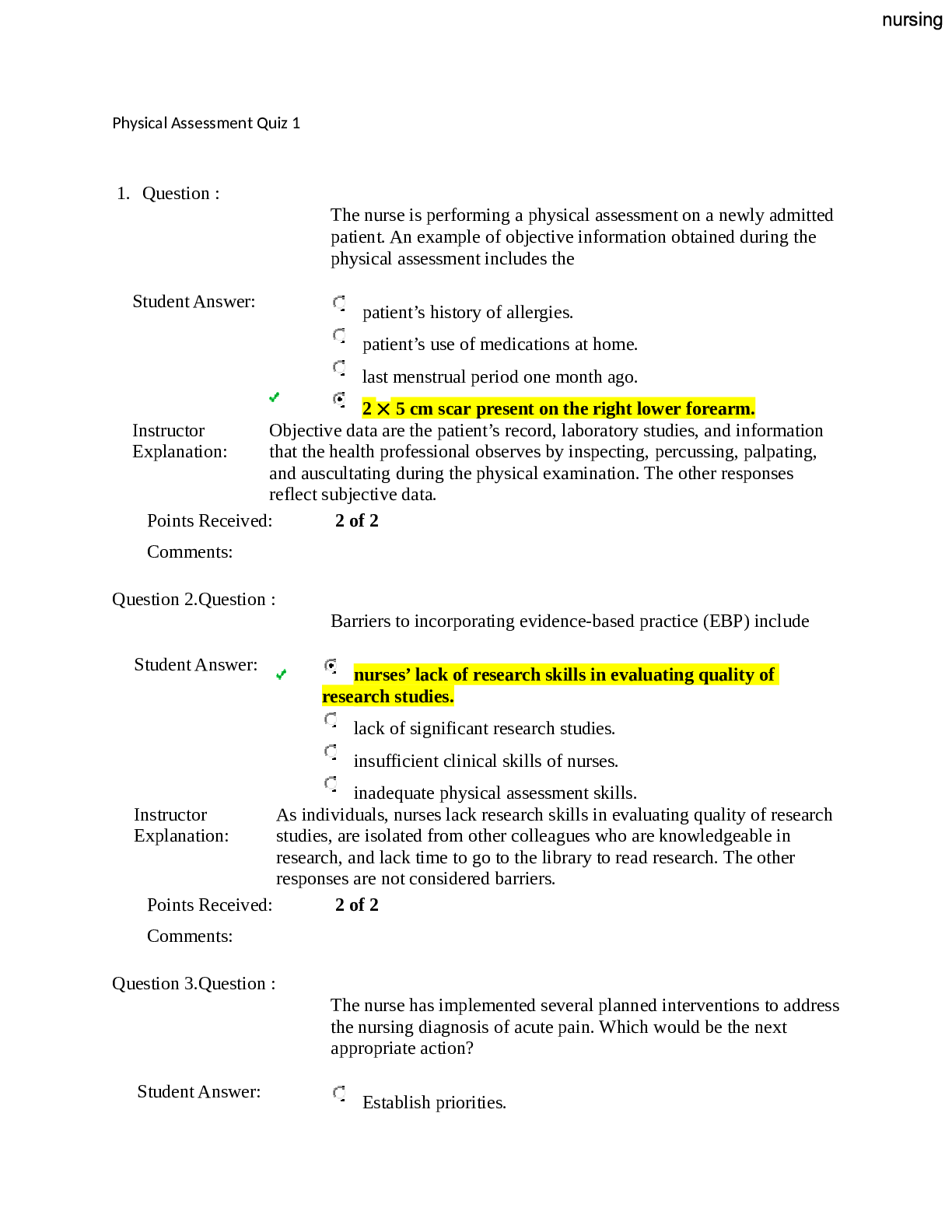
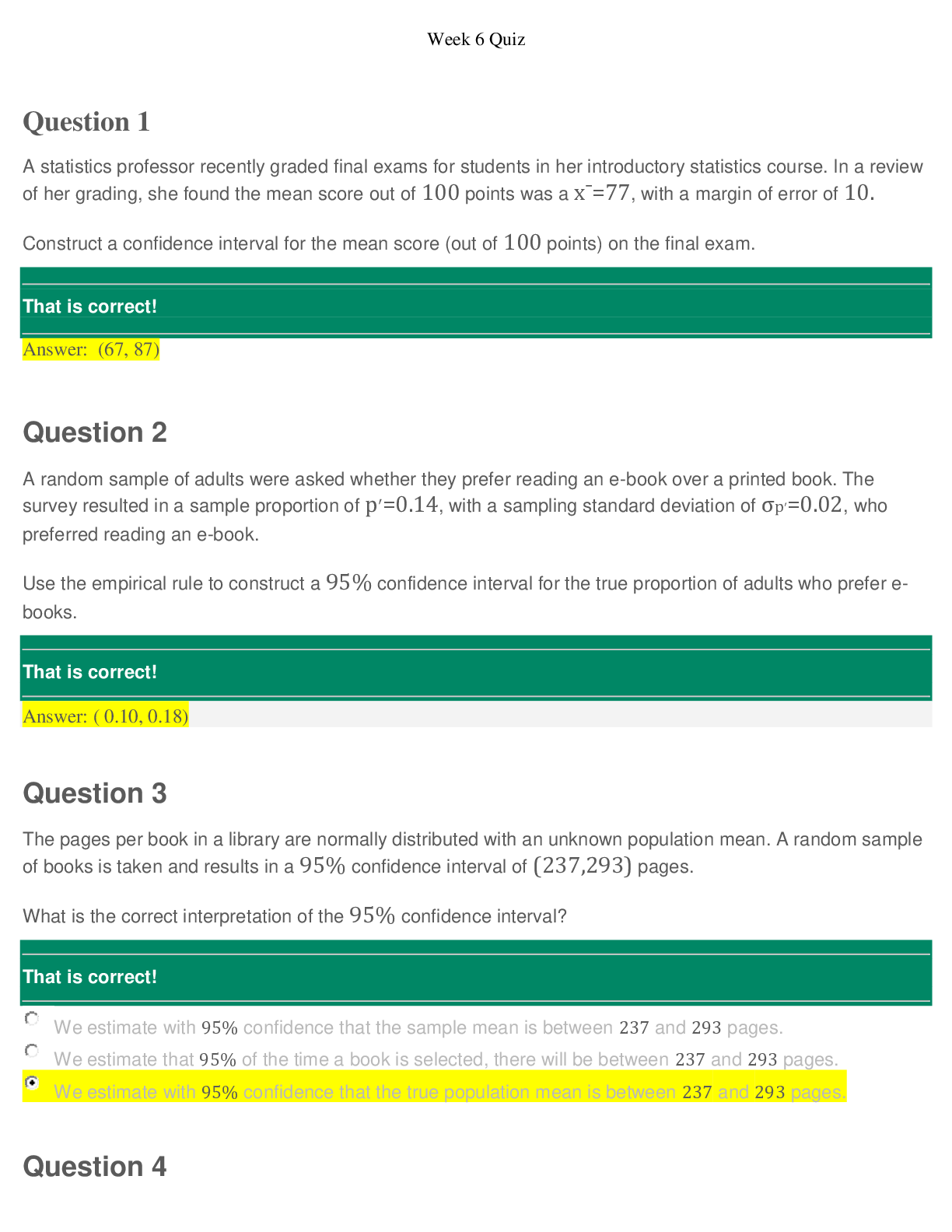
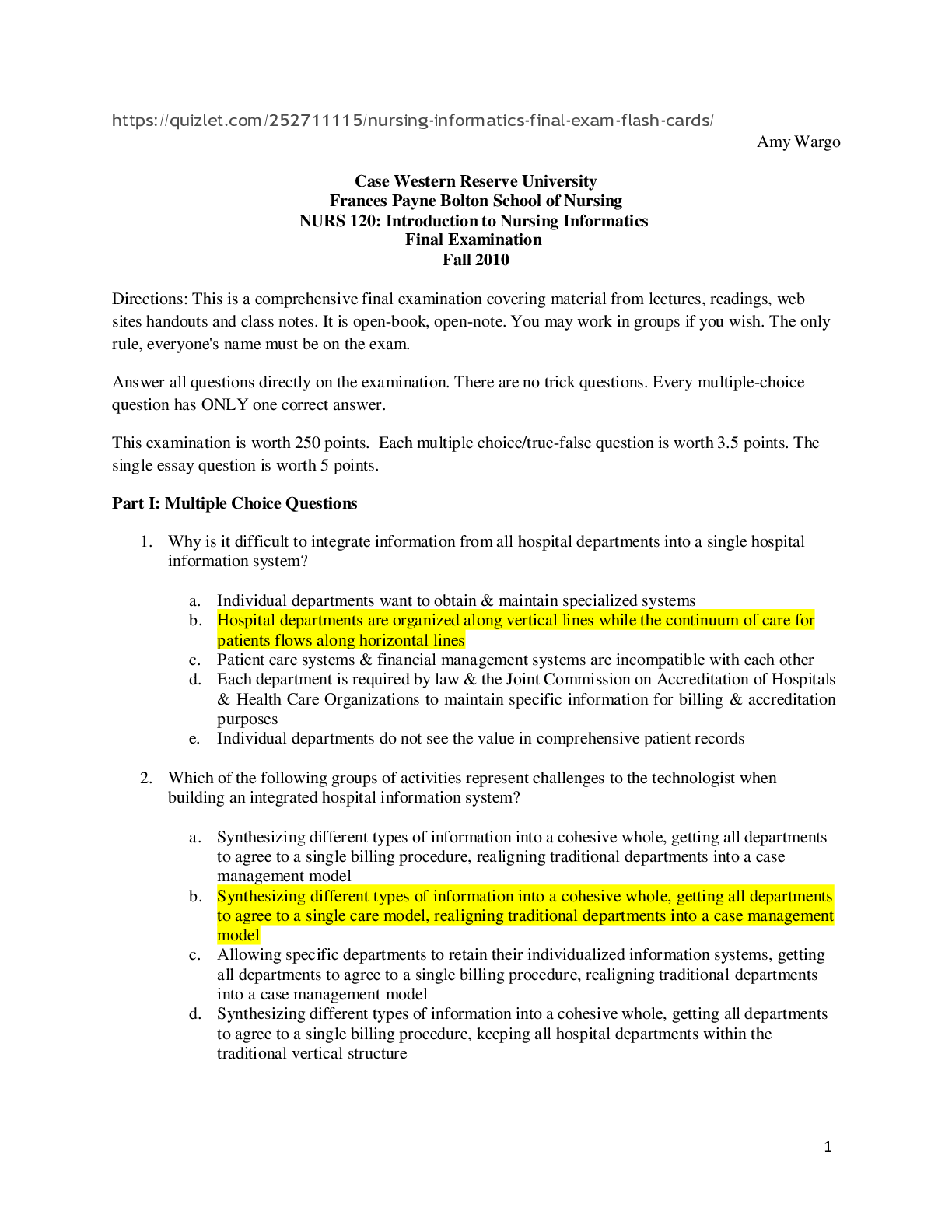
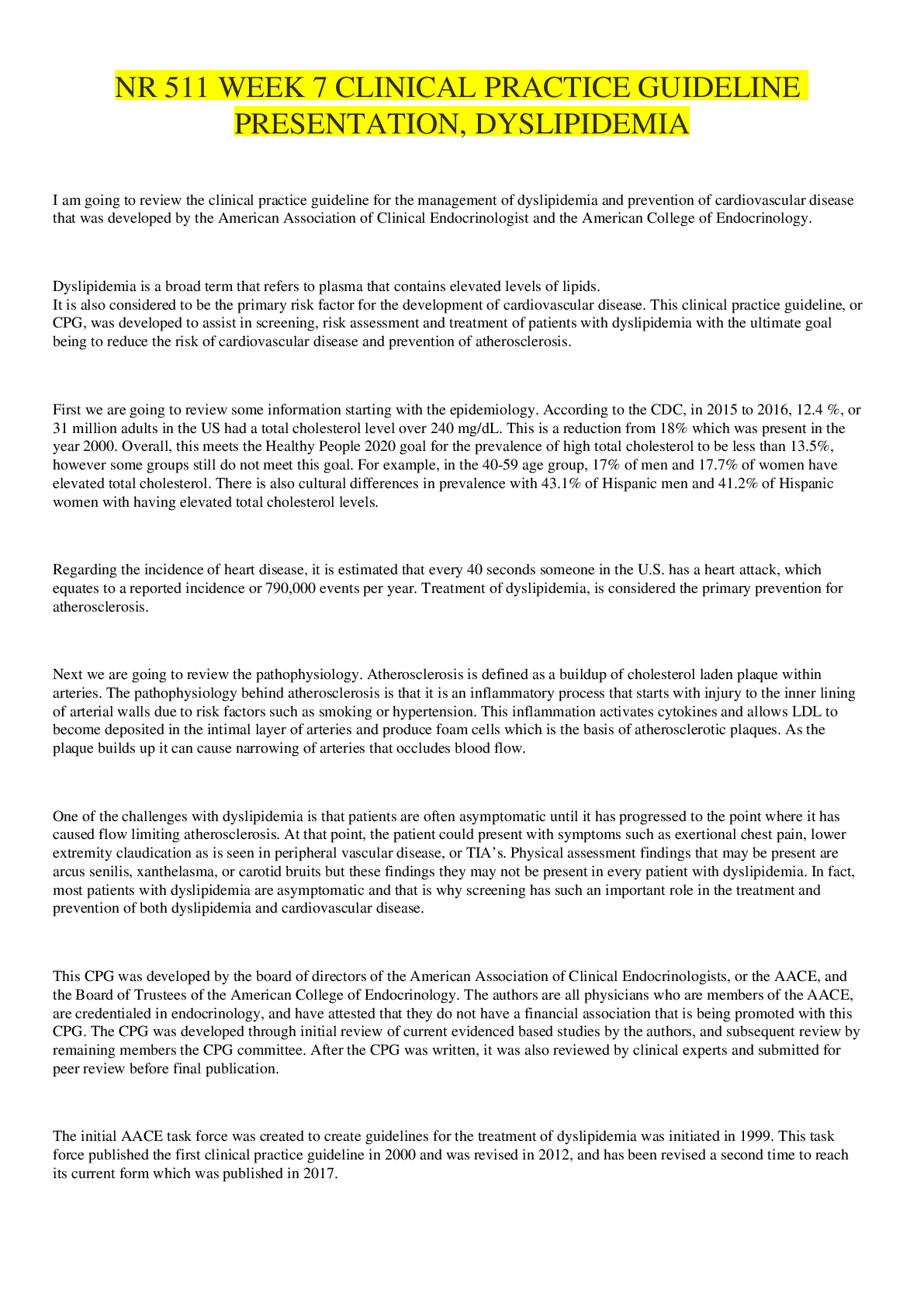
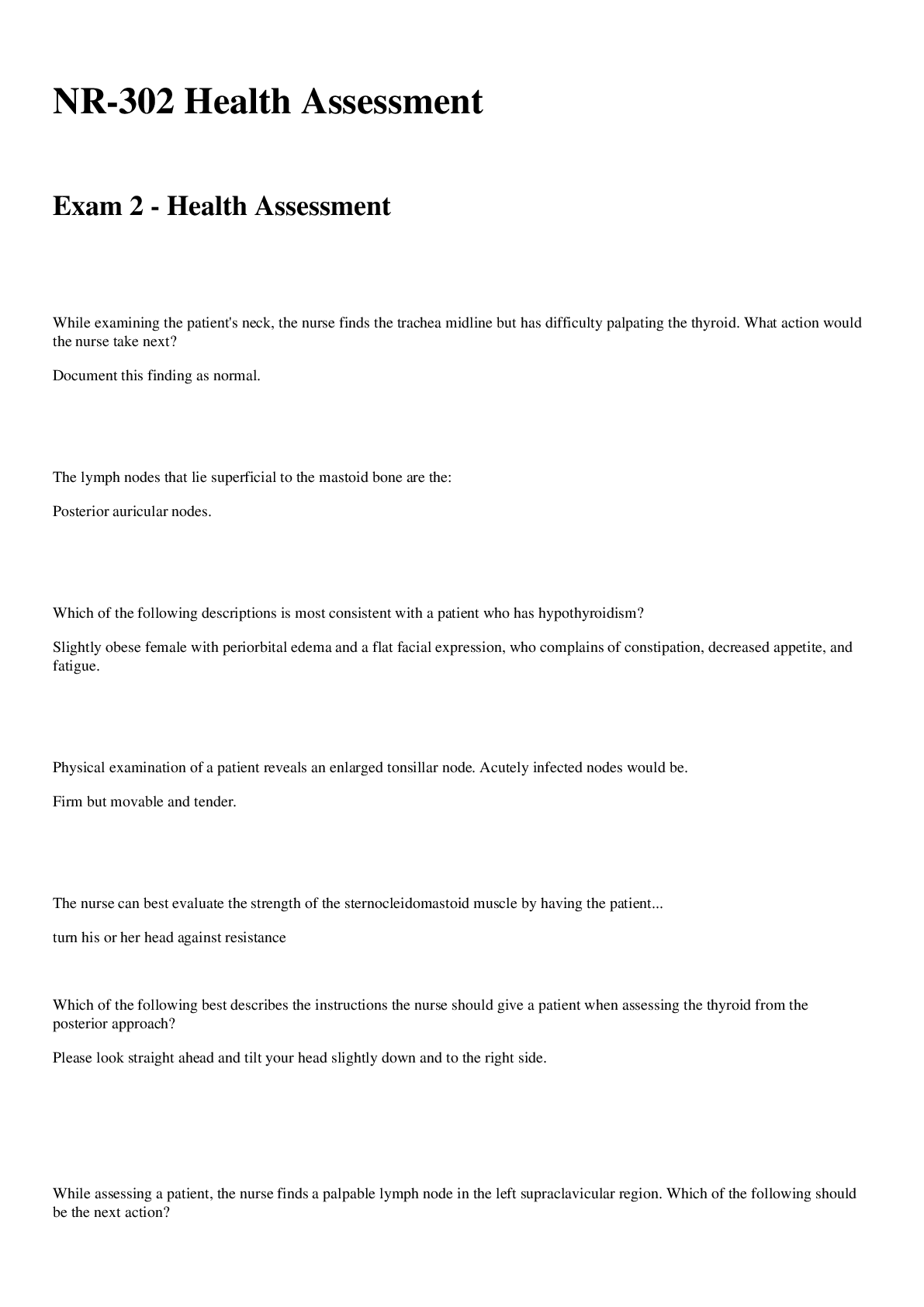
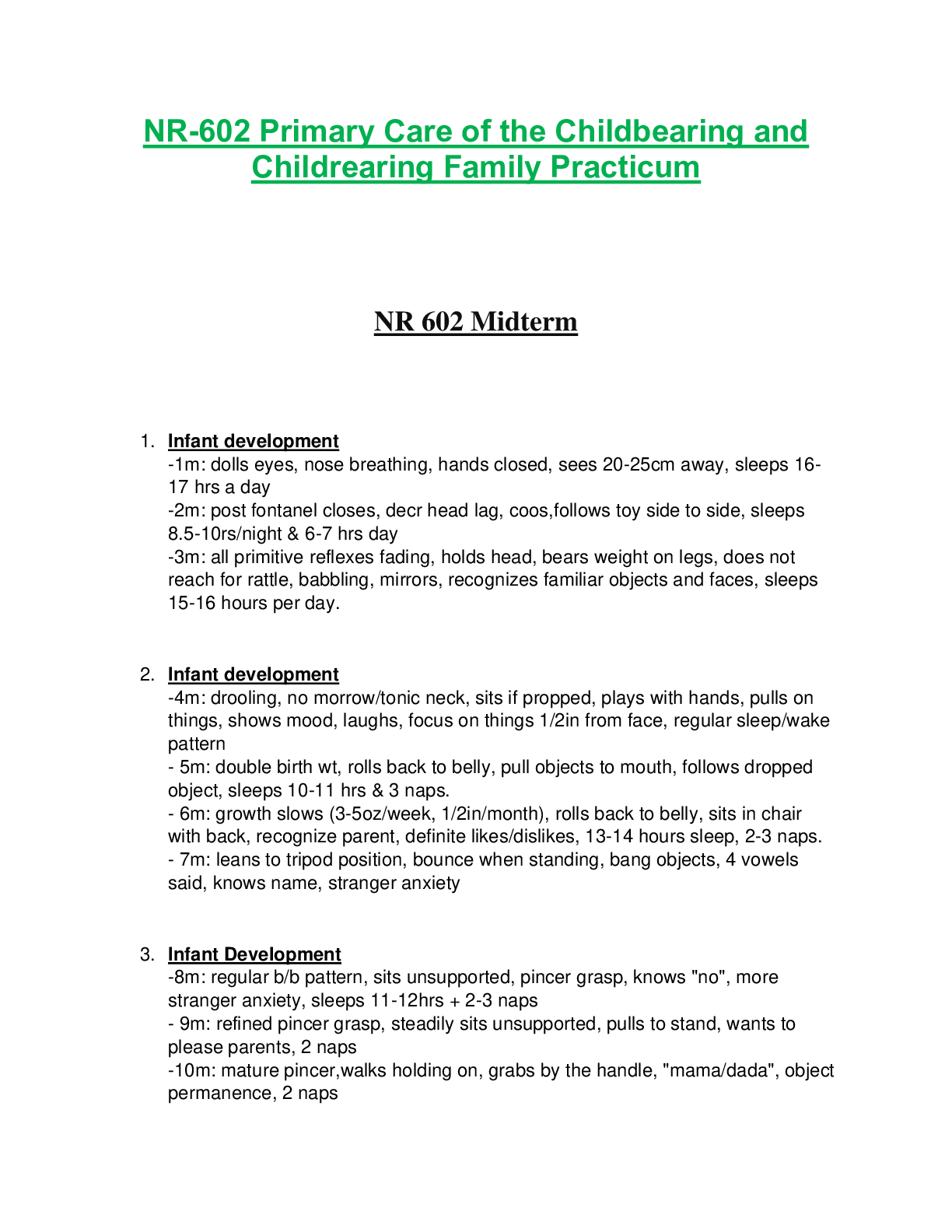
 – Chamberlain College of Nursing.png)

